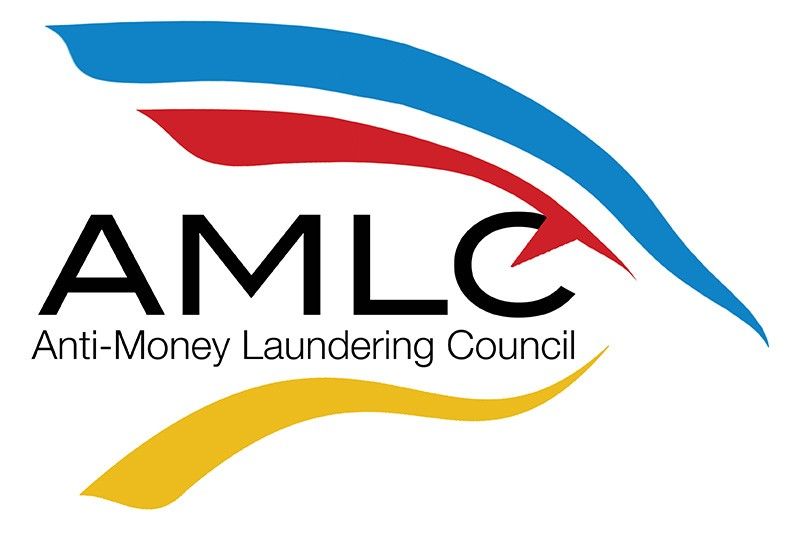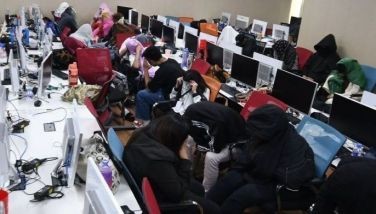AMLC freezes assets of 16 groups designated as terrorist

MANILA, Philippines (Updated 4:11 p.m.) — The Anti-Money Laundering Council has frozen the accounts of 16 organizations following their terrorist designation by the Anti-Terrorism Council.
The anti-money laundering watchdog issued Resolution No. TF-50 stating that it has directed the issuance of Sanctions Freeze Order to take effect immediately against the following groups:
- Revolutionary Council of Trade Unions
- Katipunan ng mga Samahang Mangagagawa (KASAMA) or Federation of Labor Organizations
- Pambansang Katipunan ng Magbubukid or National Association of Peasants
- Malayang Kilusan ng Bagong Kababaihan (MAKIBAKA) or Patriotic Movement of New Women
- Kabataang Makabayan (KM) or Patriotic Youth
- Katipunan ng Gurong Makabayan (KAGUMA) or Association of Patriotic Teachers
- Makabayang Samahan Pangkalusugan (MASAPA) or Patriotic Health Association
- Liga ng Agham para sa Bayan (LAB) or League of Scientists for the People
- Lupon ng Manananggol para sa Bayan (LUMABAN) or Committee of Lawyers for the People
- Artista at Manunulat para sa Sambayanan (ARMAS) or Artists and Writers for the People
- Makabayang Kawaning Pilipino (MKP) or Patriotic Government Employees
- Revolutionary Organization of Overseas Filipinos and their Families (COMPATRIOTS)
- Christians for National Liberation (CNL)
- Moro Resistance and Liberation Organization (MRLO)
- Revolution Organization of Lumads (ROL)
It is unclear what bank accounts the underground groups maintain and how these were identified.
AMLC Secretariat Mel Georgie Racela said the freeze order was issued after the ATC designated the groups as terrorist in its Resolution No. 28 (2022) dated January 26.
The watchdog said the sanction covers related accounts owned by the designated group — not limited to those tied to a terrorist act, plot or threat — and properties or funds wholly or jointly owned by the subject.
Property or funds generated from funds or other assets owned by the subject and property of persons and entities acting on behalf or at the direction of the designated group are also covered.
"All covered persons are mandated to submit as Suspicious Transaction Report all previous transactions of the designated persons within five days from effectivity of this Order," Racela added.
CPP: Order to freeze assets ‘ridiculous, dangerous’
The Communist Party of the Philippines, in a statement on Thursday, called it "ridiculous" that the AMLC was freezing the suppsoed accounts of the organizations allied with the National Democratic Front of the Philippines.
It pointed out that the organizations "are underground and operate clandestinely."
Members of the tagged groups, which they claim to be in the hundreds of thousands, are also "incognito with no public or secret records of their membership" and do not have bank accounts to freeze.
The ATC earlier designated the CPP, the NDFP and the New People’s Army as terrorists groups.
But the CPP said the AMLC move is still dangerous "because it can be used against social activists, progressives and patriotic forces, human rights defenders and critics of the tyrannical regime who have been repeatedly red-tagged by the [National Task Force to End Local Communist Armed Conflict]/ATC."
They also recalled that the recent arrest of community doctor Natividad Castro and the order to freeze assets of the Rural Missionaries of the Philippines, which the NTF-ELCAC accused of being a "communist front", an allegation that the missionaries' group rejects.
"We urge all progressive, patriotic and democratic forces, peace advocates and human rights defenders both in the Philippines and overseas to denounce the resolution of the NTF-Elcac/ATC and AMLC against the NDFP and its allied organizations and the heightening state terrorism and political repression in the Philippines," they added.
Anti-Terrorism Council
The powers of the ATC were highly contested in the 37 petitions that challenged the Anti-Terrorism Act of 2020.
Under the law, the Council may designate an individual or group, upon finding of probable cause that the subject commit, or attempt to commit or conspire in the commission of terrorism and related crimes.
The Supreme Court in resolving the pleas, however, left the law mostly intact and only struck down the “killer” proviso in the section that defines terrorism and a mode of designation.
Petitioners however vowed that they will appeal the ruling. — Kristine Joy Patag
- Latest
- Trending































